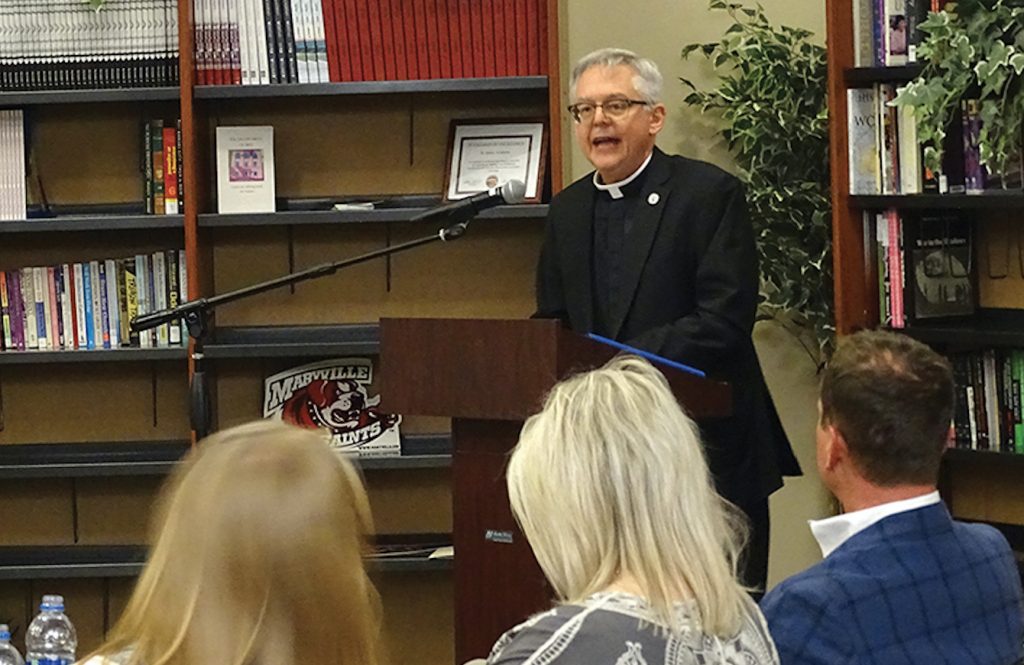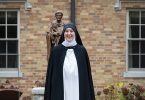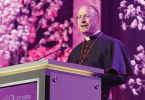
by Katie Peterson
Special to The Leaven
LENEXA — On Nov. 3, the Washington Post published an article entitled, “At 94, she was ready to die by fasting. Her daughter filmed it.”
The article explains how the woman, Rosemary Bowen, made the decision to end her own life by fasting when a back injury, due to her osteoporosis, prohibited her from living independently any longer.
Msgr. Stuart Swetland, president of Donnelly College in Kansas City, Kansas, and professor of leadership and Christian ethics, read the article aloud in his address to the fourth annual Catholic Medical Association of Kansas City’s Fall Bioethics Dinner held Nov. 9 at St. James Academy in Lenexa.
The Post article, written by staff writer Tara Bahrampour, quotes Bowen’s daughter Mary Beth, saying, “‘She said, ‘I’m sorry, but I have to do what’s right for me.’”
Further, in the 16-minute short film, which debuted at the End of Life Expo on Nov. 2, Mary Beth said her mother also wanted to hasten her death because she didn’t want to suffer a long decline in her health and become a burden to her family.
“We have to ground ourselves in reality [in discussing end-of-life issues] and the reality is this mindset,” Msgr. Swetland said. “This is what we’re dealing with.
“Two things in particular that are part of the American ethos that quite frankly are anti-Gospel are the idea of self-reliance and the idea of control.”
But the self-reliance described in the Post article was not a real one.
“I don’t want to impose on everybody. I don’t want to be a burden,” he said. “My friends, when did any human person become a burden? There is no human person who ever was, who ever will be, that is a burden.”
“A person in need is [. . .] but an opportunity for us to love and serve,” Msgr. Swetland added.
He said it is no wonder people think it is a good idea to end their life when society raises children with that anti-Gospel mentality because that’s what it means to be a “good American.”
“They feel like they can’t raise themselves up by their bootstraps anymore. Well, they never could. It is that false idea that we achieve what we achieve on our own. No one has ever done anything of merit on their own,” Msgr. Swetland said. “The only thing we can do on our own is sin. Every good act is aided by the grace of God. Jesus himself said, ‘Without me, you can do nothing (Jn 15:5).’”
The idea that one has to be self-reliant is something he said has to change. This, in turn, leads to the question of the ethic of life.
“Catholics believe in a consistent ethic of life,” Msgr. Swetland said. “It is the right to life from the womb to the tomb.”
“‘Every human being is a person,’” he added, quoting Pope John XXIII. “That means there are no non-persons in our theology.”
He went on to discuss the difference between entitlement rights and immunity rights and how it is applied to the difference between providing care and providing treatment, which he said can all be determined by the Golden Rule.
“The Golden Rule is how we judge what is disproportionally burdensome. It is not a utilitarian calculation,” he said. “It is: ‘What would we want?’”
People should never die alone and should never die without first receiving the sacramental and spiritual care the church can provide, which brings the saving grace of Christ, Msgr. Swetland said.
“Hospitals don’t call [priests] anymore. . . . That sacramental sense has been lost and that’s where you all can help,” Msgr. Swetland said. “Suffering is real, and we have to help people carry that burden.
“[The Gospel of] John [Chapter] 1 says that Jesus ‘tented with us,’” he said. “We are called to have that kind of attitude toward others, especially those who are suffering. To tent with them, to abide with them, to give an accompanying presence as they make the journey from this life to fullness of life.”
Angela Baalmann, a third-year pharmacy school student at the University of Kansas in Lawrence, said Msgr. Swetland’s lecture helped her answer questions she’s had about medical ethics.
“I got a lot of insight [from Msgr. Swetland],” Baalmann said. “He has a way of making things sound really clear.”
Msgr. Swetland’s full lecture is available online at: catholicmediakc.org.







Msgr. Swetland’s full lecture is available online at: catholicmediakc.org. – I can’t find this site. Is there a different web address?